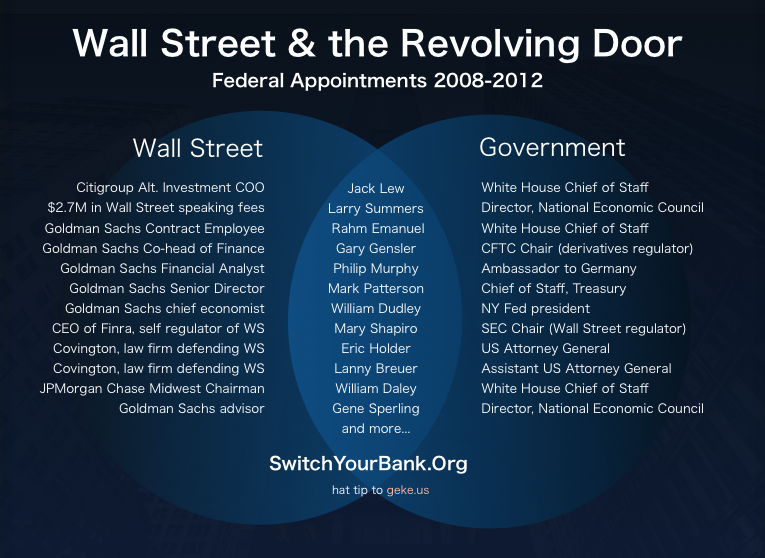Wall Street Revolving Door
While there’s nothing inherently wrong with investment bankers serving in government positions, there is something wrong with the Wall Street revolving door—when almost all the federal regulators of an industry share a sympathetic worldview with that industry. Such a setup potentially leads to groupthink, nonexistent prosecutions, and weak safeguards.
Most importantly, however, is that there seems to be favoritism in Washington for the megabanks over local lenders. When so many key advisers have backgrounds with the megabanks, theirs will be the favored worldview. This situation can lead to regulatory capture—seen when governments create non-scalable regulations, regulations that hurt small businesses particularly. See this quote from Sheila Bair about Dodd-Frank as an example.
Here are some links regarding the people listed in the venn diagram above.
Jack Lew - “For his work at Citigroup, work that included betting on the housing collapse, Lew received a salary of $1.1 million. After Citigroup received its $45 billion taxpayer bailout, Lew—two weeks before joining the Obama administration—received another $900,000 from Citigroup as a bonus.”
Gene Sperling - ”Gene Sperling, who last year took in $887,727 from Goldman Sachs and $158,000 for speeches mostly to financial companies.”
Eric Holder - “Eric Holder’s former law firm, Covington & Burling, also counts Goldman Sachs as one of its clients.”
Eric Holder, part 2 - “Goldman Sachs, JPMorgan Chase, Citigroup, Bank of America, Wells Fargo, and Deutsche Bank are among the institutions that pay for Covington’s legal advice, some of it relating to matters before the Department of Justice.”
Mary Schapiro - “When [Schapiro] left Finra in 2009 to take the SEC job, its board paid her a $9 million bonus—a little something to remember them by.”
Larry Summers - “Lawrence H. Summers, the top economic adviser to President Obama, earned more than $5 million last year from the hedge fund D. E. Shaw and collected $2.7 million in speaking fees from Wall Street companies that received government bailout money.”
Gary Gensler, who, admittedly, has made some genuine efforts to fix things, including speaking out for putting derivatives on exchanges: ”Mr. Gensler has positioned himself as a chief advocate of the law, initially lobbying lawmakers to close loopholes and now overseeing the flurry of rule-making at his agency. After a long career at Goldman Sachs and a stint in the Wall Street-friendly Clinton administration, the job has given Mr. Gensler a shot at redemption.”
And here are two articles about people not in the diagram, but who are still relevant.
Peter Orszag - “Mr. Orszag, 41, is the second cabinet official to join Citi this month, and his appointment comes days after the Treasury Department’s $10.5 billion stock offering helped further extricate the bailed out bank from Washington.”
Tim Geithner - “[Sheila] Bair joined Neil Barofsky, the former inspector general of the Troubled Asset Relief Program, in portraying Geithner as being more concerned about the welfare of the biggest banks than that of homeowners.”
Again, we’re not saying that any of these people are corrupt (well, except maybe Larry Summers… and possibly Tim Geithner), but we are saying that having so people in key positions in Washington means that Wall Street has an disparate advantage compared to local lenders.






Trusting main Street, not Wall Strret has a long history of dignity in U.S. Where white collar crime is more easily visible is the cure for too big to fail, and has always been.
Better the devil we know than the devil we don’t!